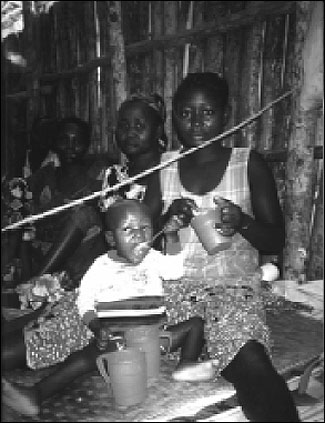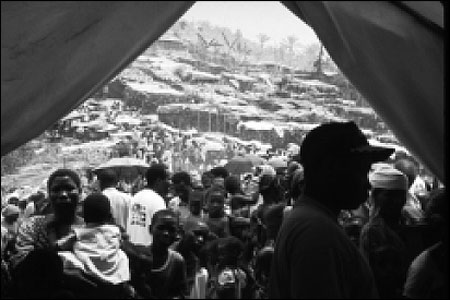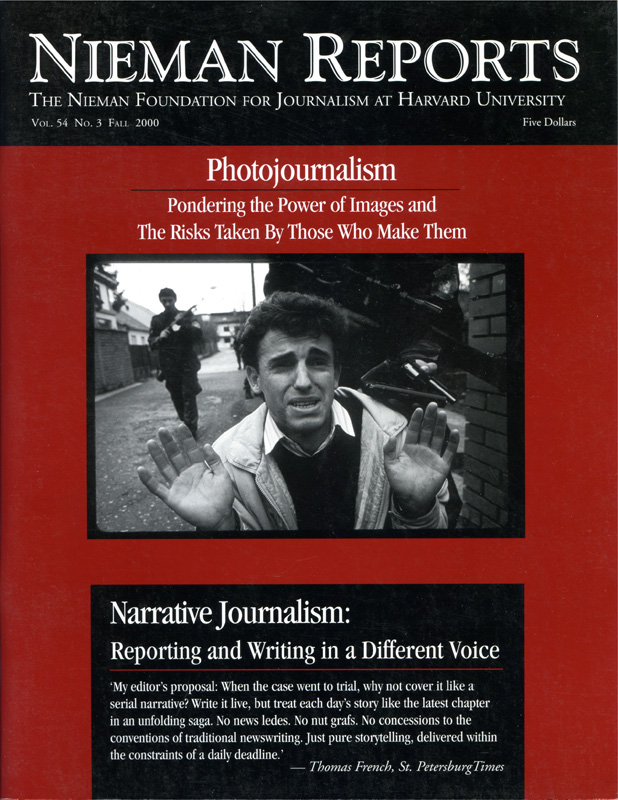In December 1999, Doctors Without Borders/Médecins Sans Frontières issued its second annual top 10 list of underreported humanitarian stories. Doctors Without Borders compiles this list to call attention to stories it believes are largely ignored by the U.S. media. The list, which is based on events witnessed firsthand by the organization’s volunteers, is not intended to be absolutely comprehensive, and the stories are not presented in any particular order.

Feeding center in Kisangani, Democratic Republic of Congo, January 2000. Médecins Sans Frontières©.
Congo Republic:
A Forgotten War Rages
There is mass displacement of persons seeking refuge from conflict between government and rebel forces, resulting in widespread malnutrition, the use of refugees as human shields, and the systematic rape of women and children.
Afghanistan:
War Enters 20th Year; Toll on Civilians Escalates
This country has the worst maternal mortality rate in the world, and women’s access to health care is severely restricted. Chronic malnutrition stunts children’s physical and mental development.
Angola:
Displacement, Landmines, Hunger Threaten War Victims
The 30-year civil war resumed in December 1998. Since then, 800,000 people have been displaced, with food, clothes and medicine being denied. In the first six months of 1999, there were 354 landmine injuries.

Dr. Darin Portnoy examining a TB patient in Uzbekistan, 1999. TB is one of the target diseases of the Access to Essential Medicines Campaign. Photo © Gary Calton/MSF.
Millions Die from Lack of Access to Medicines
Treatable communicable diseases are still the leading cause of death in developing world. Patent protection keeps effective treatments prohibitively expensive; diseases like malaria and sleeping sickness are not researched because drugs for such illnesses are not profitable for pharmaceutical companies.
Democratic Republic of Congo:
Health Care System in Ruins
Civil war divides the country, as nearly one million citizens are either internally displaced or refugees in neighboring countries. The only health care structures are those supported by foreign agencies. Plague, cholera, measles and meningitis outbreaks are frequent, malnutrition is common, and 50,000 new cases of sleeping sickness are reported each year.
Colombia:
Danger and Threats Plague Medical Staff and Aid Workers
Most victims of this undeclared civil war are civilians. Medical staff avoid dangerous areas where the need among the indigenous population is greatest. Hundreds of medical staff have been attacked and violence has spread to cities.
Mozambique:
Cholera Epidemic Strikes
Cholera epidemic began in December 1998; by May 1999, 62,000 were infected and 2,000 had died. This epidemic puts strains on limited health care resources and makes treatment of malaria, AIDS and tuberculosis more difficult.
Sri Lanka:
Civil War Intensifies
The country’s 16-year civil war escalated in November 1999. Many civilians injured by bombing and shelling, yet the government prevents displaced civilians from fleeing the impending assaults. Medical care and transport of medical supplies greatly restricted.


The regroupment camps in Burundi, 1999. Photos © Médecins Sans Frontières.
Burundi:
War and Displacement Leave Civilians Without Health Care
Since the beginning of civil war in 1993, 800,000 persons have been voluntarily or forcibly displaced by government. In summer 1999, the government moved 300,000 people into 50 regroupment camps, then prevented aid agencies from entering all but 19 of them, thereby hindering their ability to treat malnutrition and epidemics.
Somalia:
Civilians Face the World’s Neglect
International commitment decreasing as the country engages in a decade-long civil war. Health care is currently at its lowest level since 1991. There are constant epidemics and food shortages due to natural and human causes. Infant and maternal mortality rates are high and cholera, meningitis, measles are prevalent.

Feeding center in Kisangani, Democratic Republic of Congo, January 2000. Médecins Sans Frontières©.
Congo Republic:
A Forgotten War Rages
There is mass displacement of persons seeking refuge from conflict between government and rebel forces, resulting in widespread malnutrition, the use of refugees as human shields, and the systematic rape of women and children.
Afghanistan:
War Enters 20th Year; Toll on Civilians Escalates
This country has the worst maternal mortality rate in the world, and women’s access to health care is severely restricted. Chronic malnutrition stunts children’s physical and mental development.
Angola:
Displacement, Landmines, Hunger Threaten War Victims
The 30-year civil war resumed in December 1998. Since then, 800,000 people have been displaced, with food, clothes and medicine being denied. In the first six months of 1999, there were 354 landmine injuries.

Dr. Darin Portnoy examining a TB patient in Uzbekistan, 1999. TB is one of the target diseases of the Access to Essential Medicines Campaign. Photo © Gary Calton/MSF.
Millions Die from Lack of Access to Medicines
Treatable communicable diseases are still the leading cause of death in developing world. Patent protection keeps effective treatments prohibitively expensive; diseases like malaria and sleeping sickness are not researched because drugs for such illnesses are not profitable for pharmaceutical companies.
Democratic Republic of Congo:
Health Care System in Ruins
Civil war divides the country, as nearly one million citizens are either internally displaced or refugees in neighboring countries. The only health care structures are those supported by foreign agencies. Plague, cholera, measles and meningitis outbreaks are frequent, malnutrition is common, and 50,000 new cases of sleeping sickness are reported each year.
Colombia:
Danger and Threats Plague Medical Staff and Aid Workers
Most victims of this undeclared civil war are civilians. Medical staff avoid dangerous areas where the need among the indigenous population is greatest. Hundreds of medical staff have been attacked and violence has spread to cities.
Mozambique:
Cholera Epidemic Strikes
Cholera epidemic began in December 1998; by May 1999, 62,000 were infected and 2,000 had died. This epidemic puts strains on limited health care resources and makes treatment of malaria, AIDS and tuberculosis more difficult.
Sri Lanka:
Civil War Intensifies
The country’s 16-year civil war escalated in November 1999. Many civilians injured by bombing and shelling, yet the government prevents displaced civilians from fleeing the impending assaults. Medical care and transport of medical supplies greatly restricted.


The regroupment camps in Burundi, 1999. Photos © Médecins Sans Frontières.
Burundi:
War and Displacement Leave Civilians Without Health Care
Since the beginning of civil war in 1993, 800,000 persons have been voluntarily or forcibly displaced by government. In summer 1999, the government moved 300,000 people into 50 regroupment camps, then prevented aid agencies from entering all but 19 of them, thereby hindering their ability to treat malnutrition and epidemics.
Somalia:
Civilians Face the World’s Neglect
International commitment decreasing as the country engages in a decade-long civil war. Health care is currently at its lowest level since 1991. There are constant epidemics and food shortages due to natural and human causes. Infant and maternal mortality rates are high and cholera, meningitis, measles are prevalent.



